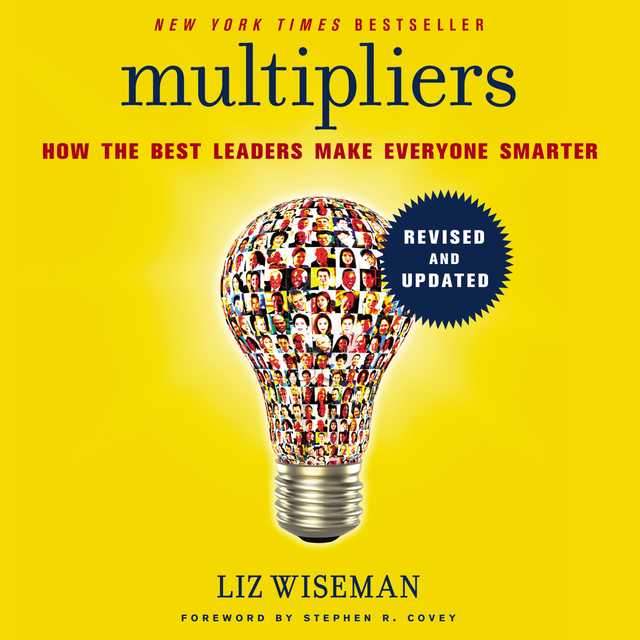Multipliers, Revised and Updated Audiobook Summary
A revised and updated edition of the acclaimed Wall Street Journal bestseller that explores why some leaders drain capability and intelligence from their teams while others amplify it to produce better results.
We’ve all had experience with two dramatically different types of leaders. The first type drains intelligence, energy, and capability from the people around them and always needs to be the smartest person in the room. These are the idea killers, the energy sappers, the diminishers of talent and commitment. On the other side of the spectrum are leaders who use their intelligence to amplify the smarts and capabilities of the people around them. When these leaders walk into a room, light bulbs go off over people’s heads; ideas flow and problems get solved. These are the leaders who inspire employees to stretch themselves to deliver results that surpass expectations. These are the Multipliers. And the world needs more of them, especially now when leaders are expected to do more with less.
In this engaging and highly practical book, leadership expert Liz Wiseman explores these two leadership styles, persuasively showing how Multipliers can have a resoundingly positive and profitable effect on organizations–getting more done with fewer resources, developing and attracting talent, and cultivating new ideas and energy to drive organizational change and innovation.
In analyzing data from more than 150 leaders, Wiseman has identified five disciplines that distinguish Multipliers from Diminishers. These five disciplines are not based on innate talent; indeed, they are skills and practices that everyone can learn to use–even lifelong and recalcitrant Diminishers. Lively, real-world case studies and practical tips and techniques bring to life each of these principles, showing you how to become a Multiplier too, whether you are a new or an experienced manager. This revered classic has been updated with new examples of Multipliers, as well as two new chapters one on accidental Diminishers, and one on how to deal with Diminishers.
Just imagine what you could accomplish if you could harness all the energy and intelligence around you. Multipliers will show you how.
Other Top Audiobooks
Multipliers, Revised and Updated Audiobook Narrator
Liz Wiseman is the narrator of Multipliers, Revised and Updated audiobook that was written by Liz Wiseman
Liz Wiseman is a researcher and executive advisor who teaches leadership to executives around the world. She is the author of New York Times bestseller Multipliers: How the Best Leaders Make Everyone Smarter, The Multiplier Effect: Tapping the Genius Inside Our Schools, and Wall Street Journal bestseller Rookie Smarts: Why Learning Beats Knowing in the New Game of Work.
She is the CEO of the Wiseman Group, a leadership research and development firm headquartered in Silicon Valley, California. Some of her recent clients include: Apple, AT&T, Disney, Facebook, Google, Microsoft, Nike, Salesforce, Tesla, and Twitter. Liz has been listed on the Thinkers50 ranking and named one of the top 10 leadership thinkers in the world.
She has conducted significant research in the field of leadership and collective intelligence and writes for Harvard Business Review, Fortune, and a variety of other business and leadership journals. A former executive at Oracle Corporation, she worked over the course of 17 years as the Vice President of Oracle University and as the global leader for Human Resource Development.
She is a frequent guest lecturer at BYU and Stanford University. Liz holds a Bachelors degree in Business Management and a Masters of Organizational Behavior from Brigham Young University.
About the Author(s) of Multipliers, Revised and Updated
Liz Wiseman is the author of Multipliers, Revised and Updated
More From the Same
- Author : Liz Wiseman
- Rookie Smarts
- Impact Players
- Publisher : HarperAudio
- Abraham
- American Gods [TV Tie-In]
- Dead Ringer
- House of Sand and Fog
- Prey
Multipliers, Revised and Updated Full Details
| Narrator | Liz Wiseman |
| Length | 11 hours 24 minutes |
| Author | Liz Wiseman |
| Publisher | HarperAudio |
| Release date | May 16, 2017 |
| ISBN | 9780062675033 |
Additional info
The publisher of the Multipliers, Revised and Updated is HarperAudio. The imprint is HarperAudio. It is supplied by HarperAudio. The ISBN-13 is 9780062675033.
Global Availability
This book is only available in the United States.
Goodreads Reviews
Mara
January 30, 2019
I think this is a book with a lot of descriptive power... I'm not sure there's a ton of huge revelations, but I really appreciated how this gave me language to talk about the kind of people I like to work for and what it feels like to work for someone who empowers you & helps you progress in your personal & professional development. Well worth a read IMO
Shaw
May 28, 2015
I learned so much from Multipliers. This book demands introspection which was painful at times but well worth it. I would consider this book foundational and a companion book for Good to Great and Mindset.
Ben
July 27, 2022
I found this a strong leadership book. I have been on a little leadership journey lately, so this book was an excellent companion. I am glad I picked this one upWould recommend!4.0/5
Phi
August 22, 2022
Such an obvious concept: leaders should be multipliers not diminishers, but sometimes managers or new managers fail to understand that. If you know someone struggling with this simple idea, this is the book for them.Will reference this book to young managers on my team.
Olga
April 23, 2021
Very inspiring and surprisingly practical
George P.
May 24, 2017
NOTE: Multipliers is a secular business book. I am reviewing it from the perspective of a Christian minister who thinks its insights have application in church and nonprofit ministry contexts. If those are not your contexts, this review may not be the one you want to readOne of the reasons why leading a church is hard work is the problem of what David Allen calls “new demands, insufficient resources.” For example, youth ministry is vital to the health and future of the church, but we all know how hard it is to get volunteers to work with junior high students. Even Jesus faced this problem: “The harvest is plentiful but the workers are few” (Matthew 9:37).The first solution to the problem of new demands and insufficient resources is specific prayer. “Ask the Lord of the harvest, therefore, to send out workers into his harvest field” (Matthew 9:38). God sees the new demands, but unlike us, He doesn’t lack sufficient resources: “my God will meet all your needs according to the riches of his glory in Christ Jesus” (Philippians 4:19).Complementing prayer is a second solution: the right people. Jesus taught us to pray for more “workers.” Paul described the Church as a “body” with variously gifted “parts” (1 Corinthians 12:12–31). The unfortunate fact is that too many pastors and other ministry leaders try to respond to new demands on their own — with only the gifts, talents and resources God has given them personally. They fail to see the gifts, talents and resources God has given them corporately, in their congregations. The consequence of this failure is burned-out pastors and leaders on the one hand and bored, frustrated and underutilized followers on the other.Liz Wiseman wrote Multipliers, now out in a revised and updated edition, to figure out how leaders can grow both the intelligence and capability of their organizations. Although she wrote it for a business audience, I couldn’t help but see its relevance to the problem of new demands and insufficient resources in churches too.Let me try to explain:Multipliers vs. DiminishersWiseman begins the book with this observation: “There is more intelligence inside our organizations than we are using” (emphasis in original). Multiplication taps into this intelligence. Its logic can be understood through three statements: 1. Most people in organizations are underutilized. 2. All capability can be leveraged with the right kind of leadership. 3. Therefore, intelligence and capability can be multiplied without requiring a bigger investment. As a former staff and senior pastor and a current church member, I agree with the first statement wholeheartedly. Too many people in any given congregation sit in the pew on Sunday morning … but nothing else. They are spiritual consumers, not spiritual producers.Regarding the third statement, I certainly hope my church can do more without investing in additional staff and buildings. I’d like to see a more productive and efficient use of what we already have before we lay out more money for sparkly new stuff.The second statement, then, is key: We need “the right kind of leadership.” Wiseman calls these leaders Multipliers and contrasts them with Diminishers. Multipliers tap into the intelligence of their organizations, grow it and increase the capability of their team members and of their organization. Diminishers “shut down the smarts of those around them.” Multipliers begin with the assumption, “People are smart and will figure this out.” Diminishers begin with the assumption, “They will never figure this out without me.”According to Wiseman, no leader is entirely a Multiplier or entirely a Diminisher. Instead, all leaders perform on a spectrum, with both Multiplier and Diminisher tendencies. This means leaders can move either way on the spectrum.Two important questions now arise: How do Multipliers lead? And how do I become a Multiplier?Multiplier PracticesWiseman’s research indicates that Multipliers lead by engaging in five specific roles: 1. The Talent Magnet: “[T]hey attract and deploy talent to its fullest, regardless of who owns the resource, and people flock to work with them because they know they will grow and be successful.” 2. The Liberator: “Multipliers establish a unique and highly motivating work environment where everyone has permission to think and the space to do their best work.” 3. The Challenger: “They seed opportunities, lay down challenges that stretch the organization, and in doing so, generate belief that it can be done and enthusiasm about the process.” 4. The Debate Maker: “Multipliers engage people in debating the issues up front, which leads to decisions that people understand and can execute efficiently.” 4. The Investor: “Multipliers deliver and sustain superior results by inculcating high expectations across the organization.” Now, before you dismiss this as so much business-book gobbledygook, try thinking of Jesus’ leadership in terms of Wiseman’s five roles:The Talent Magnet: Jesus’s disciples, despite not being religious, political, economic or academic elites, established a religion that is still thriving 2,000 years later.The Liberator: Jesus empowered His followers to preach the same message as He did, with signs and wonders following (Matthew 10:1–42; Mark 6:6–13; Luke 10:1–24).The Challenger: Read those three Synoptic Gospel passages cited above, then reminder that Jesus commissioned His followers to do these things in His absence. Not only that, He left the task to “make disciples of all nations” both to His first-century followers and to us (Matthew 18:18). The Great Commission is a perpetual challenge that Christ has called and empowered us to fulfill.The Debate Maker: We rightly think of Jesus as a master teacher, but we fail to appreciate how often He taught by means of debate. In his book, All the Questions Jesus Asks, Stan Guthrie notes that Jesus asked 295 questions. That number doesn’t even include all the questions Jesus was asked by others.The Investor: Could any expectation be higher than what Jesus told His disciples in John 20:21: “As the Father has sent me, I am sending you”?Please don’t misunderstand me. Multipliers is a business book, not a ministry book. It’s written from a secular perspective, not a biblical one. It addresses a specific question in leadership — how to leverage capability through leadership. It is neither the first nor last word on leadership, let alone the first or last word on the pastoral leadership of Christian congregations.Still, it has incredible diagnostic value because it helps identify the kinds of practices that do (and don’t) make the best use of resources in an organization, including, in my opinion, the local church.Becoming MultipliersSo, how can pastors and other ministry leaders become Multipliers?To answer that, we need to depart from Wiseman for a moment and remember the words of Jesus himself, “Ask the Lord of the harvest, therefore, to send out workers into his harvest field” (Matthew 9:38). Ministry is not about making widgets but about making disciples, and the only person who can make a disciple is one who is himself being discipled. Ministry is spiritual work and requires spiritual growth, which comes first and foremost through a prayerful relationship with the Father, Son and Holy Spirit.Ministry is also relational, however. And the ministry of leadership requires that we work in relationship with the spiritually gifted people God has placed in our pews. Wiseman offers five pieces of advice to business leaders as they resolve to move from the Diminisher to the Multiplier side of the leadership spectrum, and I’d like to tweak these for ministry settings:First, start with the assumptions: Do I assume that my congregation is spiritually gifted to do the ministry (Multiplier) or do I assume that I must do it myself or micromanage them in the process (Diminisher)?Second, work the extremes (neutralize a weakness; top off a strength): Am I surrounding myself with others whose ministry strengths complement my ministry weaknesses? Am I working hard to develop the ministry gifts that I am best at personally?Third, run an experiment: Am I actively trying to develop new Multiplier habits by identifying my Diminisher tendencies and replacing them with Multiplier assumptions and practices?Fourth, brace yourself for setbacks: Change always involves a measure of failure. The apostle Peter, for example, was the first (and only) apostle to walk on water, but also the first (and only) apostle to sink after walking on water. If Jesus picked Peter up and got him back on the boat, He can do the same for you.Fifth, ask a colleague: If “the eye cannot say to the hand, ‘I don’t need you!’ And the head cannot say to the feet, ‘I don’t need you!’” (1 Corinthians 12:21), then Christian leaders cannot isolate themselves from either their ministry peers or the people they lead. The title of Reuben Welch’s classic book on Christian community gets it exactly right: We Really Do Need Each Other.So, back to the problem of “new demands, insufficient resources” that I mentioned at the outset of this review. Yes, it is a real problem that pastors and other ministry leaders feel deeply. But prayer to our infinitely resourceful God and wise leadership practices can help us more fully utilize the capabilities of our spiritually gifted congregations. There are, after all, more spiritual gifts in our congregations than we are currently using.Are you the kind of leader who can multiply them?Book Reviewed:Liz Wiseman, Multipliers: How the Best Leaders Make Everyone Smarter, rev. ed. (New York: Harper Business, 2017)._____P.S. If you found my review helpful, please vote "Yes" on my Amazon.com review page.P.S.S. This review was written for InfluenceMagazine.com and appears here by permission.
C.W.
June 17, 2021
This listen kept me company en route to the office in my North Texas hour+ commute prior to covid. Though it’s not full of Marcus Aurelius wisdom, it put me in the mindset of how I wanted to work and work with others (which makes it a great book to me). When I choose pre-work non-fiction, I’m not looking for answers to all the world’s problems but words to put my path in the right direction. It’s a low pressure way to get yourself in the mindset for my busy stressful days in IT. Recently, I started my previous habits of non-fiction before work and realized I had another chapter or two left here, but I’ll listen to it again and again if needed. Narrator was great!
Daniel
July 12, 2011
MultipliersIn Mulipliers, authors Liz Wiseman with Greg McKeown explore the roots and applications of effective, inspiring leadership. For Wiseman, leaders can be broadly classified as either Multipliers or Diminishers. A Multiplier creates an environment where each team member is challenged, stretched, passionately engaged, and emerges not only more intelligent for having worked with a Multiplier, but exhilarated at having achieved great things . A Diminisher, as one can imagine, stunts the intellectual growth of those who work for him or her, drains teams of curiosity, and vitality itself. Indeed, for Wiseman and McKewon, to work for a Diminisher is to essentially watch yourself wither away through micromanagement, dis-engagement, and eventually emerge with a reduced sense of self worth. The Author’s key question: “What are the vital few differences between intelligence Diminishers and intelligence Multipliers, and what impact do they have on organizations?” The answer, as it turns out covers a lot of ground. Wiseman and McKeown invest the bulk of the book contrasting the practices of Multiplier and Dimishers: Talent Magnet vs Empire Builder, Liberator vs a Tyrant, Challenger vs Know it All, Debate Maker vs Decision Maker, Investor vs a Decision Maker. Each category is explained and illustrated with a mini example from the business world. This is a very helpful book for any aspiring leader who seeks to model their behaviors after what Wiseman’s research uncovers about the best practices of successful leaders. To those of you who are already experienced leaders, you may find yourself in these pages in ways that challenge your perception of yourself. On Wiseman’s website, one can even take a free survey to test their own Multiplier vs. Diminisher tendencies. I would, however, strongly suggest taking the survey first, then reading the book.
Nadya
January 22, 2020
The most ACTIONABLE book on Servant Leadership I've read!The 5 Disciplines of Multipliers framework is easy to understand, and because it contrasts these disciplines with the 5 anti-patterns (Diminishers) - its allows for a clarity to rapidly emerge.This framework and the concept of an "Accidental Diminsher," - makes the framework relatable and authentic, dismantling ego needs or face-saving.I loved the ideas in this book, in particular the Poker Chips speaking limitation, the listening ratio, and the Extreme Questions Challenge. HIGHLY recommend to anyone who has direct reports or who works in a matrix organization where influencing without authority is common.
Amanda
September 02, 2015
I loved this book and took many lessons from it. One of the biggest is that I need to work on multiplying the skills and assets of my team, instead of diminishing them. I cannot keep all of the knowledge I have in my mind or else we will not grow great and powerful leaders. This is a must read for anyone embarking on any leadership role, be it at work or in their personal lives.
Greg
April 08, 2019
One of the most practical, and inspiring leadership books I've come across. Wiseman's premise is there are Multipliers (people who make everyone around them smarter) and Diminishers (people who may be brilliant on their own, but micromanage, and inhibit the growth of everyone around them). Actually, there are very few absolute Multiplier or Diminisher personalities; most of us are someone on the continuum. But this book has excellent ideas on how we can all do more to find and bring out the genius in our teams. This inspired me to make changes in how I operate at the office, in my church calling, and with my own family.Here are some of the salient points I bookmarked as I went through the book:• A diminisher uses talent, a multiplier develops it. Diminishers blame people, multipliers explore and learn. Diminishers tell people what to do, multipliers challenge them. Diminishers decide, multipliers consult. A diminisher is an empire builder who acquires resources and wastes them, a multiplier is a talent magnet who utilizes and increases everyone's genius. A diminisher is a know-it-all who gives directives, multipliers are challengers who gives opportunities.• One characteristic of multipliers is having a great sense of humor. They use humor to create comfort and to spark the natural energy and intelligence of others.• Multipliers figure out what people are naturally good at. They ask questions like, "What is the next challenge for you?" and "What would be a stretch assignment?"• Nothing grows under a banyan tree. It provides shade and is comfortable. But it doesn't allow any growth for anything beneath it.• There is a distinction between pressure and stress. Consider the image of William Tell shooting the apple off his son's head. William who is in control feels pressure, his son who has no control feels stress. Multipliers liberate people from the intimidation of hierarchical organizations and the domination of tyrannical leaders.• After writing several books on George W. Bush, Bob Woodward said, "I think Bush is impatient. I think by summation he doesn't like homework. And homework means reading, or getting briefed, or having a debate."• Hallmarks of a great debate: It's deeply rooted in fact, not opinion; everyone is interested; participants are more interested in what they learned than in who won or lost.• In a little league football game, a frustrated coach could easily score if he went on the field, took the ball and ran for a touchdown. But he wouldn't because the rules won't allow him to. But this happens all the time in business. When the stakes are high, poor managers (diminishers) who should be coaching, take the ball from their team and try to score on their own. In business this isn't illegal, and many diminishers can't resist the temptation, and don't see the problem of what they're doing.• Multipliers never do anything for their people that their people can do for themselves.
Gepser
January 22, 2022
Key takeaway- You know when you have a bad boss but do you know when you have a great boss?Context- The author name bad bosses = diminishers and good bosses = multipliers.- Diminishers steal your energy and motivation.- Multipliers can make a good employee 2-100 times better than they would be on their own.Summary- Diminishers don't let ideas flourish. They don't let you think by yourself. When working with a diminisher, you only give 20-50% of your effort.- The story of Earvin "Magic" Johnson is awesome, he had the ability to raise the game of each teammate and it was not a natural thing happening, it was his decision.Talent magnets:- Look everywhere for talent- Identify instinctive skill(s) (and let them and everyone know this)- Put that skill in a team where is best suited (a multidisciplinary team).- Remove the obstacles- Hitting the ceiling: if a teammate has reached the ceiling in their current position, it's your duty to let them go so they may continue to grow elsewhere.Tyrants vs Liberators:- Tyrant: a boss who creates a tense atmosphere pointing out everyone's mistakes and using their authority over people.- Liberator: being able to get people to do their best work. They give people room to work. Don't constantly offer your input, just give space and trust them. They also require good work without creating fear of failure (psychological safety, which is the top 1 priority for a high-performing team, according to an internal Google study, this fact is not in the book though). This can be done by encouraging experimentation making sure they can make mistakes as long as they learn from them. In short: give space, fewer opinions, suggestions instead of orders, acknowledge your mistakes.Challenger:- Don't tell someone where to go or what to do. Just point people in a specific direction where they can develop their own ideas.- Don't give orders. Ask questions. Help them to define challenges so they may set the appropriate goals on their own.- Inspire belief. Show them it is possible.Decision Maker vs Debate Maker:- Decision maker: they decide without the opinion of the team.- Debate maker: they prepare the issues to be debated, run a debate were everyone's opinion matters, disagreements are welcome, a strong decision is reached in the end (by leadership or delegation). The outcome should be clear. Document the process. In short: just ask question, never give answers. Every answer should be supported by evidence and every participant must give answers.Micromanagers vs Investor:- When you micromanage, the team can't work without you.- Investor: define the ownership of the team members, and be sure everyone knows. Make sure they have the resources to succeed. Let them learn on their own. Ensure people are accountable.
Scott
January 18, 2023
This book entered two new words into my vocabulary of personality: “diminisher” and “multiplier.” To Wiseman, these contrasting interpersonal styles are the secret understanding to why some smart people succeed at leadership and others fail. A diminisher is someone who socially tries to prove how smart they are to everyone around them. As such, they promote themselves, not the people around them. In stark contrast, multipliers make the people around them feel smarter and more ingenious on their own. This evokes greater – in other words, multiply – results from the team (as much as twofold according to Wiseman’s data).First, it should be acknowledged that Wiseman and her team did not make up these contrasts on their own. Instead, they conducted qualitative and quantitative research into organizations to understand why some leaders can evoke great results while others do not. The methods of their research are described in an appendix. Although many readers do not like examining research methodology, it’s helpful to see that empiric research, not personal opinion, drives this book’s direction.Most of the book describes five different practices that multipliers do that diminishers do the opposite. They can seem like more personality types rooted in leadership styles. It’s helpful to know that most multipliers do slightly well on most styles but excel at just one or two. This book seeks to identify ways incrementally that people can avoid the bad practices of diminishers and promote a few more good practices.At times, this book can veer into “self-help rah-rah.” That is, it can become more motivational than substance, in spite of the research framework underlying this work. Despite these moments, most of the book communicates the central contrast of multipliers with diminishers. It definitely can evoke readers’ memories of various diminisher authority figures in their history (like bad bosses and bad teachers). Overall, such intellectual processing can prove beneficial because it can remind us why we need to steer away from negative practices that can hurt other people.This book’s intended audience mainly consists of aspiring leaders. It can also consist of current leaders who desire to raise their leadership game. This work was well-received by the reading public when it debuted several years ago and achieved bestseller status. The general message can help motivate people to focus on how their actions affect others more than themselves. While business and social audiences will benefit most from it, we can all become more attuned to how our attitudes, for better or worse, multiply on each other.
Angela
November 29, 2020
This book talks about Multipliers (who amplify others' results) and Diminishers (who, well, diminish others' results). Overall, a great book about leadership with useful insights that ANY leader (at any level of seniority) should benefit from. Still I'm only giving it 4* for a few reasons (to be fair, it's more like a 4.5).PROS:1. The book is clearly written and extremely structured, with main points, subpoints and sub-subpoints all laid out clearly.2. It has a great blend of concepts with how-to tips, with a clear breakdown of the characteristics of Multipliers vs Diminishers, how to apply the concepts to improve your own leadership, how to deal with Diminishers and how to develop a Multiplier culture. In short, pretty comprehensive. CONS:1. There's a LOT of repetition, and these 3 central messages get beaten to death: (i) Diminishers underutilize people and waste talents, (ii) Multipliers increase organizational intelligence, and (iii) Multipliers leverage resources to well, multiply results. 2. Although there are lots of examples, but the quality varies. I like detailed, illustrative examples that'd help me to visualize Multipliers and Diminishers at work PLUS pick up some useful techniques or tips. SOME of the examples delivered on that front, but IMHO at least half of the examples are just repeating the same things being rehashed throughout the book…3. There were lots of tables and diagrams. Which is great overall for a business book. Though some works better than others (somehow, I find it hard to digest info in tables, so when there're so many tables.....)I made lots of notes, but as usual but the end of a book like this, only a few ideas are top-of-mind. Two memorable takeaways for me are - (i) Don't just notice talent--label it to create awareness in other, and (ii) Don’t just hold people accountable for predetermined outcomes. Keep asking them, “is this your best work?”Book summary at: https://readingraphics.com/book-summa...
Jonathan
August 18, 2022
This is exactly the kind of book that I need to read in the stage of my career that I am in. Often books can be like that. If you read it when you are not ready to absorb the lessons or applications, you can come away thinking the book was dull or uninspired. That may be some peoples' perspective on this book, but I think it supersedes that.The book posits broadly that there are two archetype leaders, the Multiplier and the Diminisher. The Multiplier will draw out and "multiply" the intelligence of the people working for them thus getting much more out of their teams. The Diminisher often is hiring people, but not listening or engaging with them in any real way which causes the employees to atrophy or even stop trying. Not only does the author talk about these two types quite extensively, but she provides a lengthy chapter on "Accidental Diminishers" for leaders who may have good intentions and yet are accidentally underserving their team-members. All of this is done in a very clear way with lots of action items and MVP experiments to try out with your team. I have put several MVPs into action already and I think this book will likely stand out as a turning point in some of the ways I think about leadership. It could for you to. Check it out.
Most Popular Audiobooks
Frequently asked questions
Listening to audiobooks not only easy, it is also very convenient. You can listen to audiobooks on almost every device. From your laptop to your smart phone or even a smart speaker like Apple HomePod or even Alexa. Here’s how you can get started listening to audiobooks.
- 1. Download your favorite audiobook app such as Speechify.
- 2. Sign up for an account.
- 3. Browse the library for the best audiobooks and select the first one for free
- 4. Download the audiobook file to your device
- 5. Open the Speechify audiobook app and select the audiobook you want to listen to.
- 6. Adjust the playback speed and other settings to your preference.
- 7. Press play and enjoy!
While you can listen to the bestsellers on almost any device, and preferences may vary, generally smart phones are offer the most convenience factor. You could be working out, grocery shopping, or even watching your dog in the dog park on a Saturday morning.
However, most audiobook apps work across multiple devices so you can pick up that riveting new Stephen King book you started at the dog park, back on your laptop when you get back home.
Speechify is one of the best apps for audiobooks. The pricing structure is the most competitive in the market and the app is easy to use. It features the best sellers and award winning authors. Listen to your favorite books or discover new ones and listen to real voice actors read to you. Getting started is easy, the first book is free.
Research showcasing the brain health benefits of reading on a regular basis is wide-ranging and undeniable. However, research comparing the benefits of reading vs listening is much more sparse. According to professor of psychology and author Dr. Kristen Willeumier, though, there is good reason to believe that the reading experience provided by audiobooks offers many of the same brain benefits as reading a physical book.
Audiobooks are recordings of books that are read aloud by a professional voice actor. The recordings are typically available for purchase and download in digital formats such as MP3, WMA, or AAC. They can also be streamed from online services like Speechify, Audible, AppleBooks, or Spotify.
You simply download the app onto your smart phone, create your account, and in Speechify, you can choose your first book, from our vast library of best-sellers and classics, to read for free.
Audiobooks, like real books can add up over time. Here’s where you can listen to audiobooks for free. Speechify let’s you read your first best seller for free. Apart from that, we have a vast selection of free audiobooks that you can enjoy. Get the same rich experience no matter if the book was free or not.
It depends. Yes, there are free audiobooks and paid audiobooks. Speechify offers a blend of both!
It varies. The easiest way depends on a few things. The app and service you use, which device, and platform. Speechify is the easiest way to listen to audiobooks. Downloading the app is quick. It is not a large app and does not eat up space on your iPhone or Android device.
Listening to audiobooks on your smart phone, with Speechify, is the easiest way to listen to audiobooks.






























